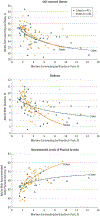Climate change: challenges and opportunities for global health
- PMID: 25244362
- PMCID: PMC6108836
- DOI: 10.1001/jama.2014.13186
Climate change: challenges and opportunities for global health
Abstract
Importance: Health is inextricably linked to climate change. It is important for clinicians to understand this relationship in order to discuss associated health risks with their patients and to inform public policy.
Objectives: To provide new US-based temperature projections from downscaled climate modeling and to review recent studies on health risks related to climate change and the cobenefits of efforts to mitigate greenhouse gas emissions.
Data sources, study selection, and data synthesis: We searched PubMed and Google Scholar from 2009 to 2014 for articles related to climate change and health, focused on governmental reports, predictive models, and empirical epidemiological studies. Of the more than 250 abstracts reviewed, 56 articles were selected. In addition, we analyzed climate data averaged over 13 climate models and based future projections on downscaled probability distributions of the daily maximum temperature for 2046-2065. We also compared maximum daily 8-hour average ozone with air temperature data taken from the National Oceanic and Atmospheric Administration, National Climate Data Center.
Results: By 2050, many US cities may experience more frequent extreme heat days. For example, New York and Milwaukee may have 3 times their current average number of days hotter than 32°C (90°F). High temperatures are also strongly associated with ozone exceedance days, for example, in Chicago, Illinois. The adverse health aspects related to climate change may include heat-related disorders, such as heat stress and economic consequences of reduced work capacity; respiratory disorders, including those exacerbated by air pollution and aeroallergens, such as asthma; infectious diseases, including vectorborne diseases and waterborne diseases, such as childhood gastrointestinal diseases; food insecurity, including reduced crop yields and an increase in plant diseases; and mental health disorders, such as posttraumatic stress disorder and depression, that are associated with natural disasters. Substantial health and economic cobenefits could be associated with reductions in fossil fuel combustion. For example, greenhouse gas emission policies may yield net economic benefit, with health benefits from air quality improvements potentially offsetting the cost of US and international carbon policies.
Conclusions and relevance: Evidence over the past 20 years indicates that climate change can be associated with adverse health outcomes. Health care professionals have an important role in understanding and communicating the related potential health concerns and the cobenefits from policies to reduce greenhouse gas emissions.
Conflict of interest statement
Figures




Comment in
-
Climate change: a continuing threat to the health of the world's population.JAMA. 2014 Oct 15;312(15):1519. doi: 10.1001/jama.2014.13094. JAMA. 2014. PMID: 25244258 No abstract available.
-
Adapting to climate change.JAMA. 2015 Feb 17;313(7):727. doi: 10.1001/jama.2014.18502. JAMA. 2015. PMID: 25688789 No abstract available.
-
Adapting to climate change--reply.JAMA. 2015 Feb 17;313(7):727-8. doi: 10.1001/jama.2014.18525. JAMA. 2015. PMID: 25688790 No abstract available.
References
-
- Intergovernmental Panel on Climate Change. Climate Change 2013: The Physical Science Basis. New York, NY: Cambridge University Press; 2013:1535.
-
- Cook J, Nuccitelli D, Green SA, et al. Quantifying the consensus on anthropogenic global warming in the scientific literature. Environ Res Lett. 2013;8(2). doi:10.1088/1748-9326/8/2/024024. - DOI
-
- Molina M, McCarthy J, Wall D, et al. What We Know: The Reality, Risks and Response to Climate Change. Washington, DC: American Association for the Advancement of Science; 2014.
-
- Intergovernmental Panel on Climate Change. Climate Change 2014: Mitigation of Climate Change. New York, NY: Cambridge University Press; 2014.
Publication types
MeSH terms
Grants and funding
LinkOut - more resources
Full Text Sources
Other Literature Sources
Medical
Miscellaneous

